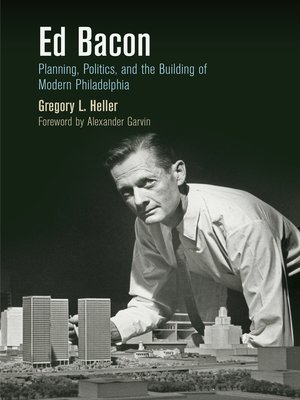Ed Bacon
ebook ∣ Planning, Politics, and the Building of Modern Philadelphia · The City in the Twenty-First Century
By Gregory L. Heller

Sign up to save your library
With an OverDrive account, you can save your favorite libraries for at-a-glance information about availability. Find out more about OverDrive accounts.
Find this title in Libby, the library reading app by OverDrive.



Search for a digital library with this title
Title found at these libraries:
| Library Name | Distance |
|---|---|
| Loading... |
In the mid-twentieth century, as Americans abandoned city centers in droves to pursue picket-fenced visions of suburbia, architect and urban planner Edmund Bacon turned his sights on shaping urban America. As director of the Philadelphia City Planning Commission, Bacon forged new approaches to neighborhood development and elevated Philadelphia's image to the level of great world cities. Urban development came with costs, however, and projects that displaced residents and replaced homes with highways did not go uncriticized, nor was every development that Bacon envisioned brought to fruition. Despite these challenges, Bacon oversaw the planning and implementation of dozens of redesigned urban spaces: the restored colonial neighborhood of Society Hill, the new office development of Penn Center, and the transit-oriented shopping center of Market East.
Ed Bacon is the first biography of this charismatic but controversial figure. Gregory L. Heller traces the trajectory of Bacon's two-decade tenure as city planning director, which coincided with a transformational period in American planning history. Edmund Bacon is remembered as a larger-than-life personality, but in Heller's detailed account, his successes owed as much to his savvy negotiation of city politics and the pragmatic particulars of his vision. In the present day, as American cities continue to struggle with shrinkage and economic restructuring, Heller's insightful biography reveals an inspiring portrait of determination and a career-long effort to transform planning ideas into reality.







